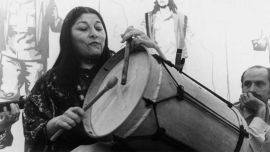Irene Alancay spent her life caring for others: as a single mother, as an aunt and as a nurse.
This week she died of Covid-19 at the age of just 36, still waiting for her first pay cheque since Argentina’s national quarantine began on March 20.
She was working as cover at Guillermo Patterson hospital in San Pedro de Jujuy, in the north-west corner of Argentina which has now become a hotspot for coronavirus cases. She was on the frontline dealing with Covid-19 patients, working round the clock with one day off a week.
When Irene fell ill in mid-August, she self-isolated at the modest home she shares with her 74-year-old mum Simona Mamani, seven-year-old son Josue, and nephews Nathaniel (12) and Alvaro (10).
When her health worsened in early September, there was no room for her in the intensive care wards of the hospital where she had been working. Eventually, she was finally transferred to a hospital in the provincial capital of San Salvador de Jujuy.
Her oldest sister Antonia, who lives in Once, Buenos Aires City, launched a desperate appeal over social media for plasma donors, but it would be in vain: Irene died of respiratory failure at 9pm on Monday, September 7.
“She was a marvellous person, she helped everyone in the world. She went to Patterson hospital as a fill in. I begged her not to go, but she always wanted to help,” said Antonia, 50, who is also a nurse, and is about to qualify as a doctor. Irene was working off and on from the middle of March, but by the time Covid-19 hit hard in Jujuy towards the end of June, she was working six days a week.
“Irene has been working for four years as a nurse, always informally ["en negro"], as a replacement. Whenever they needed her, she would go. In Buenos Aires, we get paid twice as much for working shorter hours, six a day compared to eight in Jujuy. They have one nurse for five or six patients,” said Antonia. “There is a total abandonment by the authorities of the population at large and particularly the health-workers. We paid out of our own pockets for a mask for my sister.”
INSECURITY AND INFECTIONS
There are an estimated 450,000 health workers nationwide, with roughly one in four working on short contracts or cash in hand, the FESPROSA union estimates.
For most, job insecurity is rife.
“In the Posadas hospital of Buenos Aires, the biggest in the country, 80 percent of staff are on short contracts. In San Luis province, 90 percent of contracts are for three months,” said FESPROSA President Fernanda Boriotti.
Numbers of healthcare workers who have died after being infected with Covid-19 are difficult to ascertain exactly. Last month, at least two unions confirmed the deaths of at least 60, though some now put the count at 110. An estimated 30,000 have been infected.
In Jujuy Province, which comprises only two percent of the country’s population, Irene is one of five nurses who have died among an estimated 5,000 public health workers, making the death rate more than four times the national average (one in 1,000, as opposed to one in 4,153).
Celina Castellon, the president of the Nurses College in Jujuy, said: “There are a lot of avoidable deaths among our members.
We’ve been talking to the government since May about preparing for the wave of infection, we’ve had six months to prepare, but there is still a lack of workers and protective equipment, which is the very least carers on the frontline should expect. The population has grown over the last five years, but the health service has shrunk.”
Jujuy’s Radical governor Gerardo Morales has been dubbed the “Bolsonaro of the Puna” by critics in the province, and he angered healthcare workers recently by threatening to fine those who refused to volunteer for frontline duty battling Covid-19. He later withdrew the threat, and recently tweeted that 159 new medics were arriving to help the province, taking total numbers to 538. Nursing staff, however, continues to be understrength.
“How could they not find a bed for a health worker in the hospital ward where she was working?
Imagine the pain I felt, not being able to go and try and save my sister,” Antonia told the Times.
“She was a single mother who also looked after her nephews, after their mother died. She was the sole breadwinner. The government of Jujuy needs to resign and go. The health system has completely collapsed.”























Comments